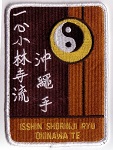First, let me give you a name. Ophira Bergman. Important person we will come back to.
In the late 70’s and early 80’s, sport karate was kind of finding its identity. The biggest tournaments were the open tournaments, with every style represented, from the soft and super-quick flash of the Chinese styles, to the ridged power of Kyokushin and Shotokan, and everything in between. Forms were usually judged in 2 major groups, hard style and soft. The judges were high ranking belts from the styles competing. Sparring was judged by a mix of hard style and soft style judges. The hard/soft designation didn’t seem to matter much in the sparring. “A punch is a punch and a kick is a kick.” Some of these judges were very good and made a name for themselves as tournament officials. Others might not have been so good, but the organizers needed officials. They were thankful for anyone willing to officiate. A weaker judge could be protected by putting him/her with a strong team. Training of officials might be just a pre-tournament discussion of the rules in effect for that tournament. Some organizers, especially in tournaments with special rules and procedures, would send out pamphlets or other literature for potential judges to study before the tournament. Rules could vary from tournament to tournament. Competing in a tournament was a true adventure in many ways.
This was also the genesis of systems for ranking sport competitors. One of the first computerized rating systems was the Martial Arts Rating System, or M.A.R.S. Each point, penalty, score, etc. in the tournament was recorded on a form and sent to the main office where it was converted to computer data. There the data was analyzed and ratings emerged. When they first started, MARS needed data. Many dojos who had interest in MARS started running smaller tournaments. It was an effort to generate data and it worked.
Today, sport karate is much more defined. The goal of many karateka back in the 70’s and 80’s was to see karate become an Olympic sport. That goal has been realized. There is a clear path to getting a sport into the Olympics. One of the most important requirements in the USA is that the sport be recognized by the AAU.
This is where Ophira Bergman, former National and Collegiate champion, reappears. Amongst other things, she is on the AAU National Karate Referees Committee and the main trainer of tournament officials in AAU’s Southern California Karate program. I have attended some of her training sessions. The attention to detail and uniformity of judging criteria is remarkable. Ms. Bergman constantly drives home the idea that the competitors have worked very hard to be at their very best and that it is paramount that the officials work just as hard to be fair and consistent. This unflinching dedication to producing tournament officials of the highest quality has finally been rewarded. Karate is an Olympic sport, too late for a young black belt from the late 70’s with aspirations, but early enough for him to be happy that, in some small way, his efforts all those years ago may have played a small part in the recognition of his sport.
 |  |  |


